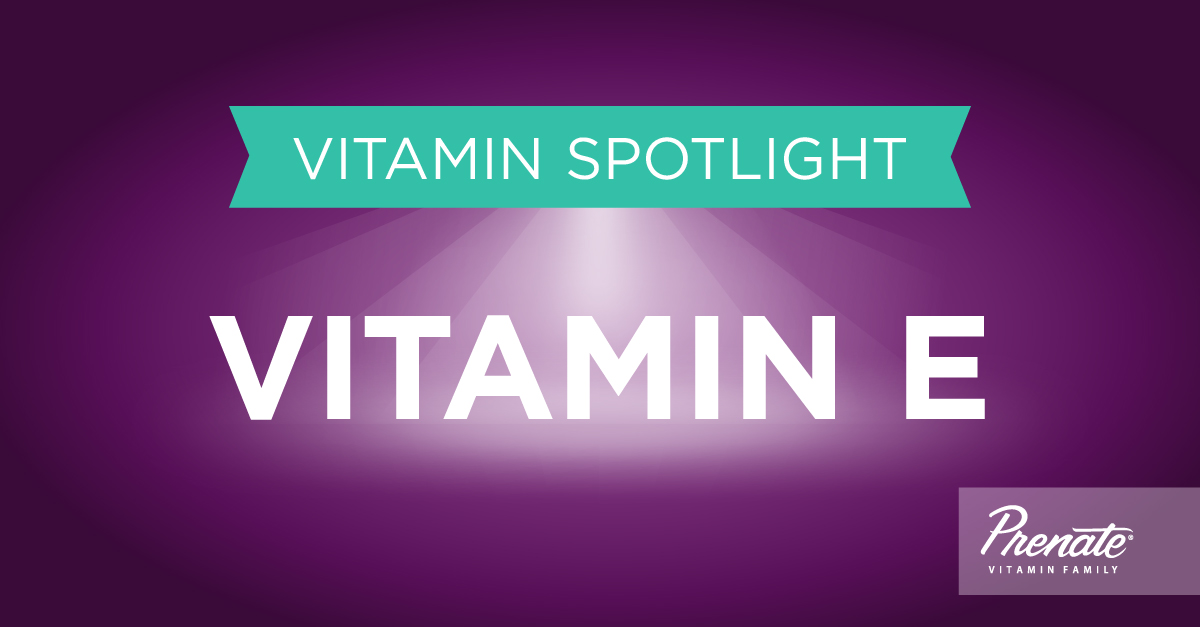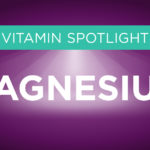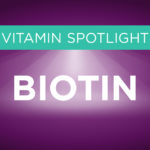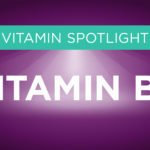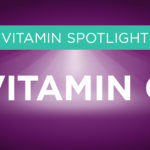Vitamin Spotlight: Benefits of Prenatal Vitamins Containing Vitamin E
July 13, 2015
Vitamin E is a term used for a group of fat-soluble vitamins that have anti-oxidant capabilities. It is found in many foods and it is important to many body functions. In this month’s Vitamin Spotlight we’ll explore some of the benefits and recommendations for Vitamin E consumption.
How Much Vitamin E Do I Need?
The U.S. National Institutes of Health recommends a different amount of Vitamin E per day depending on age and stage of lifecycle.1
| Life Stage | Recommended Daily Intake |
| Infants (0-6 months) | 4 mg (6 IU) |
| Infants (7-12 months) | 5 mg (7.5 IU) |
| Children (1-3 years) | 6 mg (9 IU) |
| Children (4-8 years) | 7 mg (10.4 IU) |
| Children (9-13 years) | 11 mg (16.4 IU) |
| Teens (14-18 years) | 15 mg (22.4 IU) |
| Adults | 15 mg (22.4 IU) |
| Pregnant Teens & Women | 15 mg (22.4 IU) |
| Breastfeeding Teens & Women | 19 mg (28.4 IU) |
What are the Benefits of Vitamin E?
Vitamin E acts as an antioxidant and helps fight free-radicals. Antioxidants work by binding to free oxygen in the blood thereby promoting healthier DNA synthesis and cellular division. Antioxidants therefore may help contribute to overall bodily health and status.
People can be exposed to free radicals multiple times a day from cigarette smoking, air pollution, and even the sun. Vitamin E, as source of antioxidants, may helps protect our cells from these sorts of damaging exposure.2
Other benefits of Vitamin E including supporting immune health, aiding in the creation of red blood cells, and may assist in more efficient Vitamin K metabolization. Supplementing your body with Vitamin E (400 IU) combined with other antioxidants – i.e. Zinc (80 mg), Beta-Carotene (15mg), and Vitamin C (500 mg) – may help support healthier vision.3
How Do I Ensure I Am Getting Enough Vitamin E?
Vitamin E is found in many different kinds of foods and added to some fortified foods. Nuts, seeds, fruits and vegetables are good sources of vitamin E.1 Listed below are some of the foods that contain Vitamin E, with approximate amounts a pregnant woman might want to consider in coordination with their nutritionist or doctors in reaching the daily recommended intake: 1
- Wheat Germ Oil – 1 Tablespoon
- Sunflower Seeds – 2.5 Ounces
- Almonds, Dry Roasted – 3 Ounces
- Peanut Butter – 10 Tablespoons
- Kiwi – 15 Kiwis
- Mango – 10 Cups
- Raw Spinach – 20 Cups
- Broccoli – 6.25 Cups
Prenatal Vitamins with Vitamin E
Many people have a hard time consuming the amount of vitamin E they need through food alone. A good way to ensure that you and your baby are getting sufficient amounts of Vitamin E is by supplementing with a prenatal vitamin from the Prenate® Vitamin Family. The Prenate® family of vitamins are formulated to meet the nutritional needs for of every step of the pregnancy cycle – from preconception through pregnancy, delivery and breastfeeding. Talk with your doctor about which Prenate® may be right for you. Click on the product name below to learn more about our Prenate® vitamins with vitamin E or to download special savings coupons:
- Prenate Pixie® – A small, easy-to-swallow softgel with complete prenatal nutrition support, including 350 mg of DHA
- Prenate Mini® – A small, easy-to-swallow softgel with complete prenatal nutrition support, including 350 mg of DHA
- Prenate® Enhance – Advanced prenatal softgel vitamin with 400 mg DHA – the highest level among leading Rx brands − plus highly absorbable forms of folate, 1,000 IU vitamin D3, Formical® calcium, and more
- Prenate® Restore – A softgel vitamin specially designed for the needs of breastfeeding mothers and babies that includes probiotics and DHA to help restore and support GI and immune health
- Prenate DHA® – A prenatal vitamin containing 10 vitamins and minerals including 300 mg DHA, 1 mg folate, calcium, vitamin D3 and iron
- Prenate Elite® – A prenatal vitamin containing 17 vitamins and minerals including 1 mg folate, calcium, vitamin D3 and iron
- Prenate Essential® – A prenatal vitamin containing 13 vitamins and minerals including 300 mg DHA, 40 mg of EPA, 1 mg folate, calcium, vitamin D3 and iron


